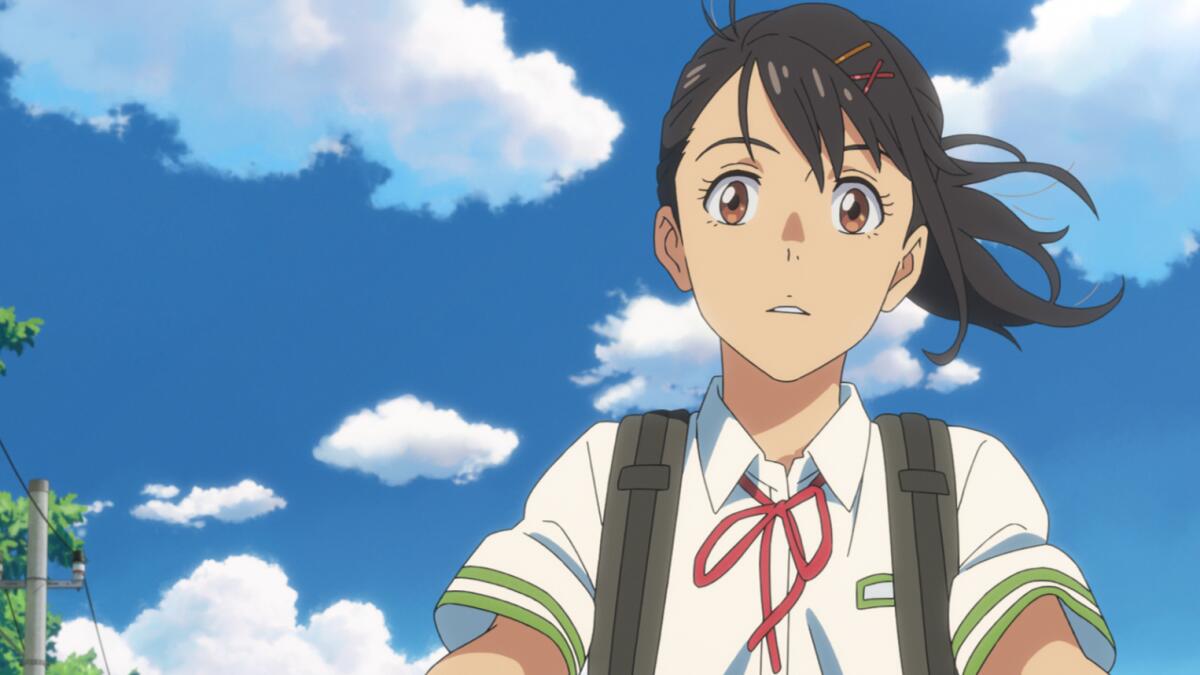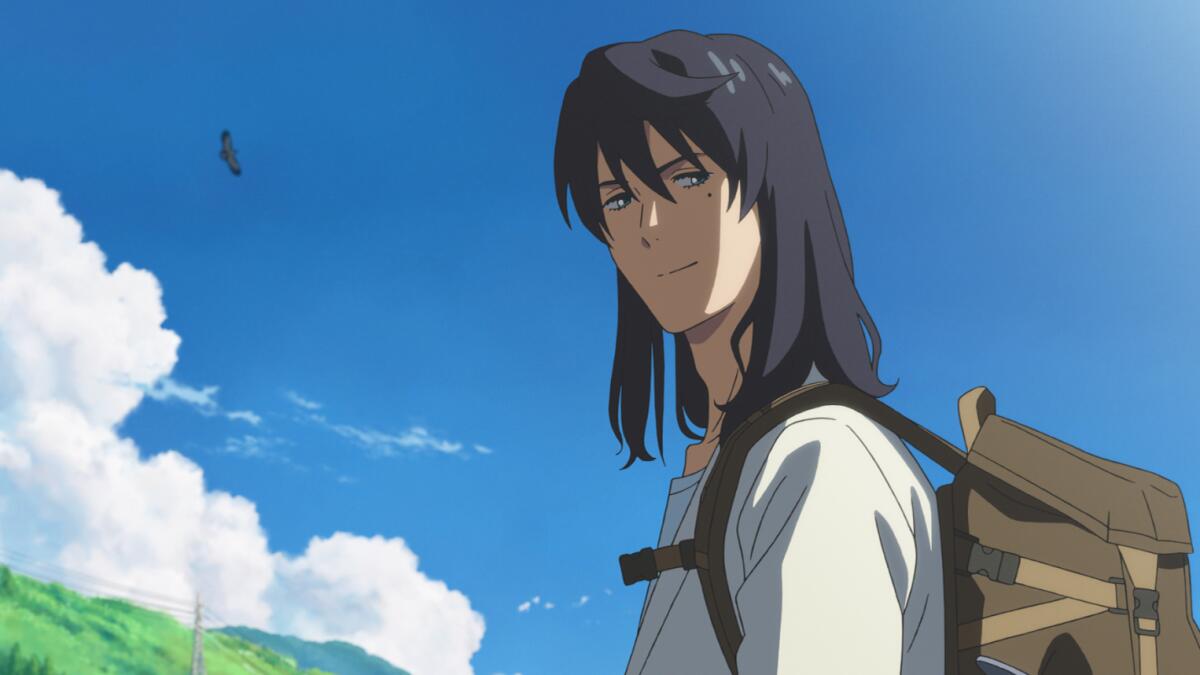Review: ‘Suzume,’ about a girl who falls for a chair, is worth the price of a seat

- Share via
Admirers of the gifted Japanese writer-director Makoto Shinkai will recognize his touch from the opening moments of his often entrancing new animated feature, “Suzume.” An affecting story about love and salvation, loss and memory, the movie opens on a dark-blue sky kissed by pastel-sunset pinks and purples, with stars that gleam like perfectly inlaid jewels. You might expect to see a fiery comet streaking past, much like the one that wreaked such beautiful havoc in Shinkai’s 2016 smash hit, “Your Name.” But the doom that looms here is of a different sort, rooted in somber memories of the 2011 Tohoku earthquake disaster, and realized in the form of a serpentine red monster, known only as the Worm, that portends yet another cataclysm in the making.
The task of holding that monster at bay — of keeping this Worm from literally turning — falls to the unlikely figure of Suzume (voiced by Nanoka Hara in the Japanese-language version), a 17-year-old who’s cut from the same sweet-and-spunky cloth as numerous other anime heroines. Suzume unwittingly sets a potential cycle of destruction in motion when she stumbles on what looks like a door to nowhere but turns out to be a portal to a distant dimension known as the Ever-After. A born adventurer, Suzume is intrigued by what lies beyond the doorway, which seems to beckon to her like a half-forgotten dream. But that dream begets a nightmare when the Worm bursts forth through the portal like a furious airborne serpent, one that will cause an enormously destructive earthquake if it makes landfall.
In short order, Suzume joins forces with Souta (Hokuto Matsumura), a handsome young man of mystery armed with a magical key and mighty incantations, which help contain the immediate threat. Together they set out to seal these deadly doors all across Japan, from Suzume’s home island of Kyushu to the sprawling metropolis of Tokyo. It’s a gravely serious mission, lightened but also complicated by unsurprising comic touches: There’s a fast-moving little cat, Daijin (Ann Yamane), an impish White Rabbit to Suzume’s Alice. And then there’s the unexpected inconvenience of Souta being turned, very much against his will, into a chair.
Yes, a child’s little wooden chair, with one missing leg and a faded coat of yellow paint. There turns out to be deeper significance to this particular choice of object, but at first the sheer, inexplicable oddity of Souta’s transformation is exactly what makes it work. Although trapped in furniture form, he can still run, sleep and talk, and he and Suzume forge an emotional connection as eccentric as it is profound. His dependency on her — it’s she who rescues him, more often than not — only strengthens that connection. Suzume carries Souta for much of their journey, lest the sight of a sentient chair attract unwanted viral attention.

The ubiquity of social media is one of the story’s wryer, subtler undercurrents. But even as he gestures toward the everyday presence of online technology, Shinkai nudges his characters — and our attention — toward physical structures and landscapes that have faded into obsolescence. The dangerous doors that Suzume and Souta must track down tend to pop up, tellingly, in places that time has forgotten: the ruins of an old bathhouse, an abandoned amusement park. To close those doors requires an act of commemoration, an acknowledgment of all the people who used to inhabit these spaces, and who for various reasons inhabit them no more.
That sense of loss gives “Suzume” a bittersweet resonance, in which the echoes of March 11, 2011, are only occasionally made explicit. This isn’t the first time Shinkai has raised the specter of environmental disaster within the context of a swooningly sentimental teenage fantasy, and if this one doesn’t achieve the dazzling intricacies or soaring emotional heights of “Your Name,” its easy blend of enchantment and feeling is nearly as hard to resist. Like that film and its follow-up, the lovely “Weathering With You,” “Suzume” has been a huge commercial success in Japan; it’s receiving an appreciably wide release in North American theaters, in both an English-dubbed version and a subtitled Japanese-language version (the one reviewed here, and the one you should seek out).
It’s an optimistic tale at heart, in which neither Suzume’s own childhood experience of grief — nor her sometimes tough relationship with the aunt (Eri Fukatsu) who raised her — is beyond the reach of healing. It’s also a story about the everyday kindness of strangers and, as I’d be remiss not to point out, the delicious-looking meals they serve to our hungry, grateful heroine. That’s nothing new for Shinkai either, and it never gets old.
‘Suzume’
In Japanese with subtitled English and dubbed English versions
Rating: PG, for action/peril, language, thematic elements and smoking
Playing: Starts April 14 in general release
More to Read
Only good movies
Get the Indie Focus newsletter, Mark Olsen's weekly guide to the world of cinema.
You may occasionally receive promotional content from the Los Angeles Times.











